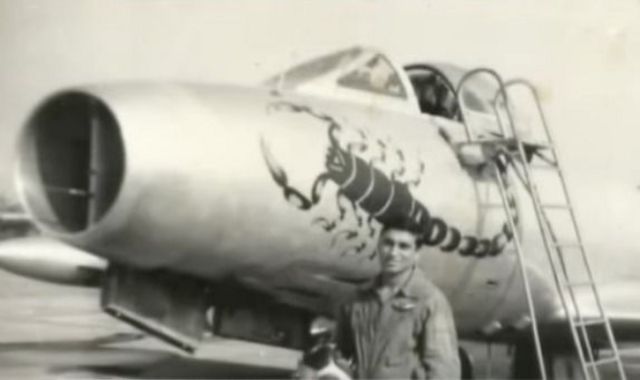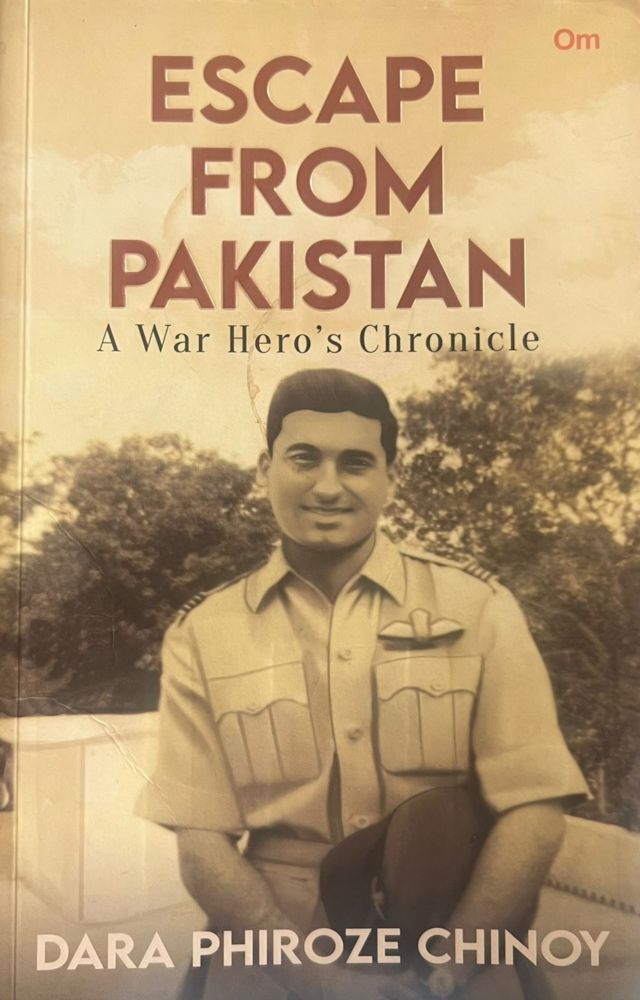[ad_1]
In the 1965 Indo-Pakistani War, the Indian army aimed to grab important territory as much as the Ichogil Canal whereas aiming to defeat the Pakistani forces decisively.
The Ichogil Canal, constructed within the Fifties, posed a major hindrance, with Indian troopers regularly underneath artillery fireplace behind the canal. The Pakistani artillery positions had been inflicting havoc on the Indian Army, compelling them to stay low and impeding their makes an attempt to cross the Ichhogil Canal.
In response, the Indian Army sought help from the Indian Air Force to neutralize these artillery positions. Consequently, the IAF was entrusted with the mission to remove considered one of these targets in South Pakistan.
On September 10, 1965, Flying Officer Dara Phiroze Chinoy, a 20-year-old Parsi hailing from Mumbai, took flight in a French-manufactured Dassault Mystere fighter bomber from the Adampur air base in Punjab.
Despite being a newcomer to the service, having acquired his fee simply two years prior, Flying Officer Chinoy’s unit was tasked to focus on a Pakistani artillery place simply throughout the border in Pakistani Punjab.
Brimming with eagerness to cost into battle alongside his squadron companions, the younger Flying Officer didn’t take a second to have a hasty meal or perhaps a sip of water. This oversight practically proved deadly within the subsequent vital hours.
Shortly after commencing the mission to focus on the Pakistani positions, as he ascended to provoke the assault on the gun place, he skilled a forceful influence on the base of his plane. In the dire scenario, his fighter jet was engulfed in flames.

He transmitted a distressing message: “I am hit.” The cockpit stuffed with thick smoke and escalating warmth in seconds, rendering the plane’s instrument panel and the skin world invisible.
Amidst the billowing smoke, he discerned the grim actuality — the engine had succumbed, and smoke and flames had been relentlessly infiltrating the cockpit from the rear.
Chinoy’s plane was geared up with a 2×68 mm rocket pod, and its gas tank was at three-quarters capability.
In this precarious situation, the end result could be deadly if his airplane descended beneath 2,000 toes. Quickly, Dara Chinoy initiated the ejection sequence and hit the ejection button.
In his book ‘Escape from Pakistan: A War Heroes Chronicle,’ Chinoy vividly recounted, “When I was coming down, I could hear the sound of rifle bullets. In between, anti-aircraft artillery shells were also passing beside me. Several bullets pierced my parachute. Then I thought they were trying to target me.”
“Luckily, I fell into a sugarcane field. Sugarcane was not harvested, so I got a chance to hide. As soon as I fell, I could hear the screams and abuses of Pakistani soldiers and the sound of automatic gunshots,” he added.
How Did Chinoy Escape To India?
Chinoy ran by a sugarcane subject in a zigzag sample like a deer, pushed by worry that made him even quicker. Instead of going east, the place Pakistani troopers may count on him to go towards the Indian border, he went west.
As time handed, the noise of autos and Pakistani troopers chasing him light away. He saved creeping, altering route to the north after some time. He ran and rested for about two hours in sugarcane fields.
In an important second, Chinoy knew staying nonetheless was his finest probability. He prayed for darkness and used it to bury his map, radar sheets, and something that might assist the enemy.
He additionally lined his face with mud. His G swimsuit was soaked in sweat and grime, mixing in with the environment and rising his possibilities of not being caught.
After a quick relaxation, Chinoy cautiously set out towards the east underneath the quilt of the deepening evening. He navigated the tall grass and sugarcane fields, purposely avoiding villages and folks. Being noticed by even one individual or a canine might set off an alarm.

Chinoy was acutely conscious that since his departure that morning, he had solely consumed a cup of tea and had gone with out water for the previous twenty hours. Thirst and exhaustion had been starting to decelerate his actions. The scorching warmth, anxiousness, and fixed operating had severely dehydrated him.
He knew that if fatigue overcame him and he ended up within the palms of the Pakistanis, the therapy might be brutal. There was an actual threat of being shot on the spot.
Despite this, he pressed on, overcoming the worry and crossing a waist-deep water canal, adopted by the swift-flowing Ichchogil canal.
Upon reaching the Amritsar-Batala highway, Chinoy felt he had efficiently crossed the India-Pakistan border. Spotting a nicely close to a village, he hurried in the direction of it, drawing up a bucket of water.
His confidence was rekindled after quenching his thirst and refreshing himself by pouring the water over his head. He then proceeded to stroll south alongside the Amritsar-Batala highway. Intentionally steering away from the primary highway, daybreak approached, and Chinoy quickly heard voices conversing in Tamil.
Chinoy gathered his braveness and shouted boldly, “Who’s there?” Startled by his matted look, lined in grime and dirt, one soldier pointed a rifle at him, commanding, “Raise your hands.” Chinoy complied, dropping to his knees and elevating his palms in give up.
Indian troopers started interrogating Chinoy, expressing disbelief about him being an Indian Air Force pilot. Chinoy requested them to contact his officer for affirmation.
Chinoy was instructed to sit down within the again seat of the jeep, and inadvertently, an Indian soldier by chance triggered his rifle, with the bullet narrowly lacking Chinoy. This incident was louder than a subsequent reprimand from the subedar main.
Later, Chinoy was dropped at a captain who demanded to see their id card. Chinoy defined that he didn’t carry an id card throughout missions.
Dara Firoz Chinoy was questioned about his unit and commander. He revealed his station commander’s identify, Group Captain Jock Lloyd. Further inquiries led to a revelation about one other officer in his staff.
This piqued the curiosity of the captain interrogating him, who turned out to be the cousin of the talked about officer. Recognizing the connection, the captain greeted Chinoy warmly, providing him breakfast and occasional.
The Indian Army officer facilitated Chinoy’s transport to the Air Force Center in Amritsar after Chinoy had a refreshing bathtub.
Exhausted, Chinoy fell asleep within the jeep and woke as they entered the middle’s gate. Unexpectedly, 4 Pakistani Sabre jets attacked the middle’s radar unit, prompting Chinoy and others to hunt refuge in a bunker to keep away from the bombs.
Following these harrowing experiences, Chinoy was pushed by the station commander to the Air Force base in Adampur. His return to the bottom shocked and delighted his colleagues. The subsequent day, he underwent a medical examination and was declared match to renew flying duties.
On September 23, a ceasefire was declared between India and Pakistan, however Chinoy’s return to India was saved secret.
Three months after the battle concluded, on January 1, 1966, then Chief of Air Staff, Air Chief Marshal Arjan Singh, awarded Flying Officer Chinoy the Vishisht Seva Medal for his exceptional escape from Pakistan and secure return to India.
Chinoy, who eventually retired as a Group Captain, demonstrated unimaginable resilience by surviving life-threatening conditions on three separate events over fifty years.
Even earlier than his 1965 ordeal, as a trainee pilot in 1964, he ejected from an Ouragan fighter over the Brahmaputra river attributable to a extreme lack of management brought on by a malfunctioning electrical trimmer — a vital plane management system.
In 1987, Chinoy faced one other life-threatening scenario when he needed to eject from a MiG-21 after a chook strike severely affected his jet’s performance. Despite these shut encounters with dying, his ardour for aviation remained unwavering.
After retiring from the Air Force, Dara Chinoy continued his love for flying as a civilian pilot. He collected intensive flight hours, piloting company plane for prestigious entities just like the Tatas and the Ambanis.
[adinserter block=”4″]
[ad_2]
Source link